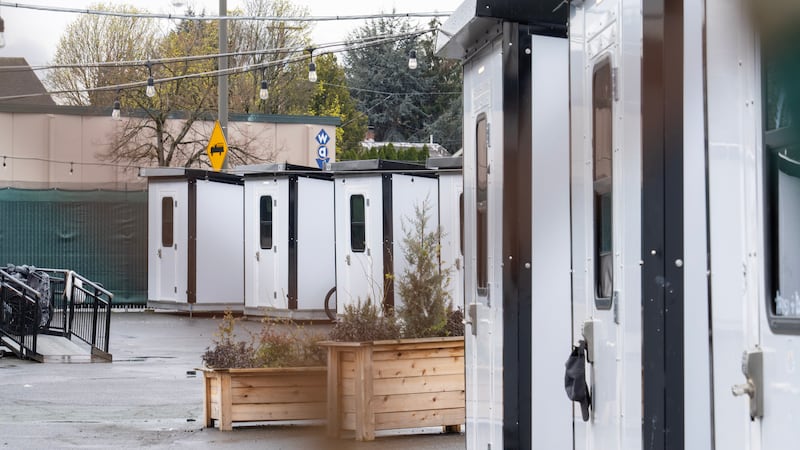Edward Wilson-Drake spent more than two tough years homeless in Portland. His tents kept getting ripped apart by thieves, so he abandoned them for blankets rolled out in secluded spots. He suffers from Crohn’s disease, a chronic bowel condition that frequently sent him on an often futile search for a public toilet.
His situation changed in early October, when he gained entrance to Clinton Triangle, a large city shelter site in Southeast Portland managed by San Francisco-based nonprofit Urban Alchemy. He moved into an 8-by-8-foot heated pod. A flush toilet was within easy walking distance.
“I am grateful. Looking back, I don’t know how I made it,” Wilson-Drake, 33, says.
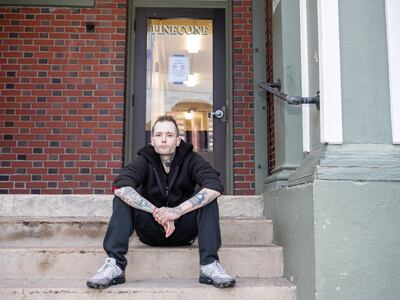
Clinton Triangle is the first of a new generation of large shelter sites launched in a push by Mayor Ted Wheeler to ease Portland’s homelessness crisis, which, along with public drug consumption, has emerged as a pivotal civic concern. Those who stay at Clinton Triangle then have the opportunity to move to apartments where their first year of rent is covered by state taxpayer dollars, funneled through Multnomah County, which also pays for caseworkers to assist them.
Urban Alchemy operates Clinton Triangle and two smaller sites: Reedway in Lents, which will double in size to 120 sleeping units, and Peninsula Crossing in North Portland, with 60 pods. Later this year, Urban Alchemy will take over management of another site under development in North Portland that will offer shelter to 200 people in pods and RVs.
Urban Alchemy was founded in 2018 and by March of last year reported $61 million in revenues from providing public agencies with services that range from street teams stationed at intersections in San Francisco to managing shelters in Austin. Under a contract with the city of Portland, the organization will be paid up to $50 million through February 2028 to manage Clinton Triangle and other sites.
The City Council’s vote last April to bring Urban Alchemy to Portland generated intense criticism from homeless activists who, in public testimony, attacked the formation of large camps, questioned Urban Alchemy’s track record elsewhere, and decried the scale of the taxpayer investment.
Since then, Urban Alchemy has emerged as an important player in Multnomah County and the city’s joint response to homelessness, which in a plan released earlier this month calls for providing shelter to nearly 2,700 people by Dec. 31, 2025.
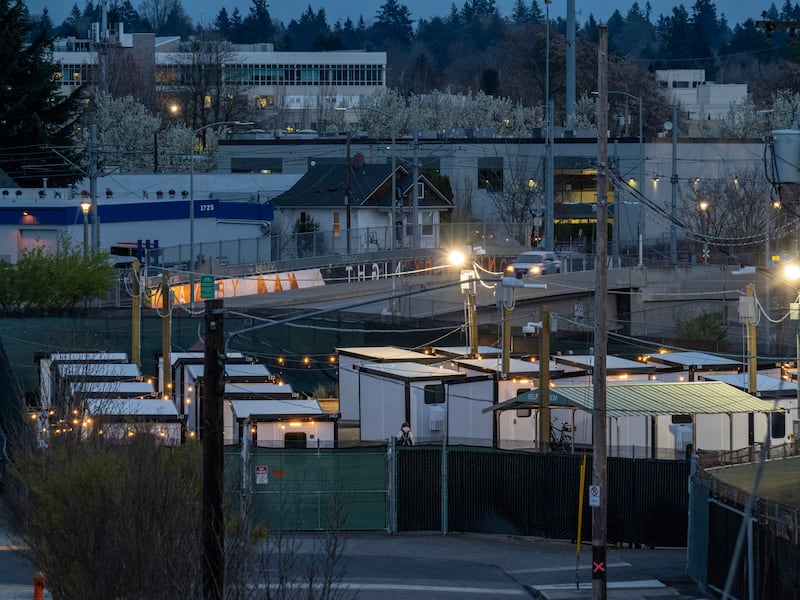
As Urban Alchemy expands in Oregon, WW sought a deeper understanding of the nonprofit’s Portland operations, along with broader efforts to move people off the streets, first to Clinton Triangle, then into apartments. The reporting for this story included interviews—off site—with more than 25 past and current residents of Clinton Triangle, as well as representatives of Urban Alchemy, neighborhood groups, and other nonprofits involved in assisting the homeless.
Most Clinton Triangle residents who spoke to WW (called guests by Urban Alchemy) were hopeful their time at the site could mark a turning point in their quest to move off the streets. At Clinton Triangle, which opened in July, people can secure birth certificates and other documentation needed to become renters, and connect to dental, health counseling, and other support services.
As of March 1, Clinton Triangle has been a springboard for 108 people to move into apartments, 13 to get reconnected with their families, and another eight to be referred to substance use disorder treatment. These transitions represent about 1 in 3 of the more than 370 people who stayed—or are currently staying—at Clinton Triangle. (Most came in an October-to-January push as the county made state funds available.) Cody Bowman, the mayor’s spokesman, cites the placements to make the case that Clinton Triangle, despite all the pushback, is a “huge success.”
But some guests, as well as two former Portland staffers, challenged Urban Alchemy’s narrative that it creates healing spaces that will help people make a successful transition to housing. They told WW that some staff dealt drugs at the site, used them or sought to buy them from guests. And a Portland woman who stayed at Clinton Triangle has accused two male staffers of sexual misconduct (see this story).
There are also longer-range concerns about the outcomes for guests who move from Clinton Triangle to apartments. Many who pass through the site have struggled with drug addiction. If they continue to use, or relapse, in the isolation of their units, the risk increases that they will lose shelter once the subsidies run out.
“If you are not healing the underlying problem that may have gotten them there, then all of this is just a big spin cycle of money,” says Lance Orton, a former heroin addict and executive director of CityTeam of Portland, a faith-based nonprofit that helps addicts move off drugs.
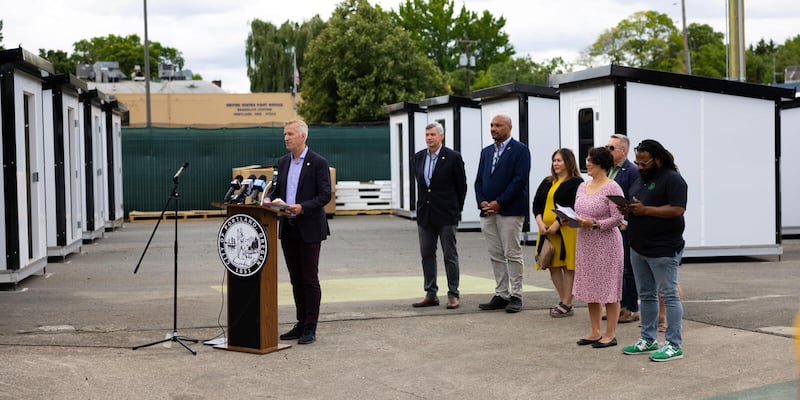
To try to keep people sheltered, Do Good Multnomah, a Portland nonprofit involved in many of the Clinton Triangle placements, has assigned each new apartment tenant two caseworkers—one for “peer support” and another for “housing retention”—and money will be available to help some tenants with rent for longer than a year.
Do Good Multnomah will track what happens to these people over time, says Chris Gardner, director of communications and marketing for Do Good.
One client who left Clinton Triangle for an apartment is already back on the streets.
Andy Allen Joens, 42, had his lease terminated by a property management firm that cited the presence of two large dogs that drew complaints from other tenants. In February, Joens returned to living in a tent, along with his two dogs, on a slope near the east shore of the Willamette River.
“I feel like I was played like a puppet,” he says. “It was so quick. It was insane.”
The Clinton Triangle site spreads across more than 6 acres near a MAX station and railroad tracks in an industrial area of Portland just east of the Ross Island Bridge. It includes a former warehouse that serves as office headquarters for Urban Alchemy in Portland, as well as a gathering place for guests to watch television, pick up snacks, or eat their evening meal.
“You could call it a legacy project.” says Hank Smith, a policy and communications staffer for Mayor Wheeler who has worked closely with Urban Alchemy and community groups to launch Clinton Triangle. “You could also call it a response to what is overwhelming pressure and feedback from the community. Everybody’s asking—do something.”
Related: Portland’s big bet on pod camps comes with a hefty price tag.
Most guests stay for three months or less in rows of electrically heated pods largely spread across an asphalt and concrete lot once used for storing construction equipment. The chain-link border fence shaded with green privacy awnings has a sole entry gate. People who pass through it are not allowed to retain firearms or other weapons. Once inside, violence—or threats of violence—will get them booted out.
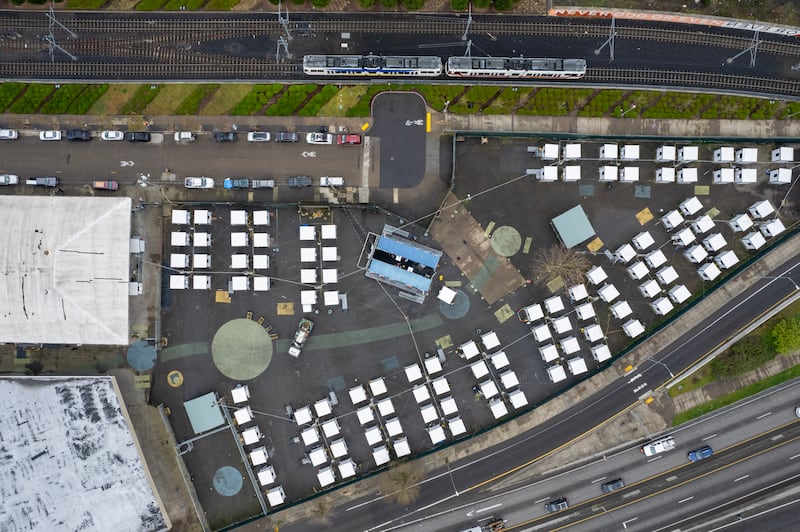
More than 70 Urban Alchemy staff—called practitioners—work at the site in round-the-clock shifts, some making periodic patrols of the area within 1,000 feet of the site where tent and RV camping is banned and less frequent forays farther into the community in outreach to the homeless.
Urban Alchemy recruits the vast majority of staff from the ranks of the formerly incarcerated. Those who have served time have the life experience “to transmute human suffering” into peace, according to the organization’s website. Urban Alchemy chief executive officer Lena Miller credits their conflict resolution skills honed in prison for the success of the organization, which she helped to launch after years leading another nonprofit that assisted residents of San Francisco’s historically Black Bayview-Hunters Point neighborhood.
New arrivals at Clinton Triangle must sign, and are supposed to agree to follow, a community guidelines document that states “drugs and alcohol are not permitted in the program.”
But drug use will not get people evicted from Clinton Triangle, which is described by city and Urban Alchemy officials as a “low barrier” site. This means “you are not going to get kicked out of housing because you have a substance abuse problem,” says Kirkpatrick Tyler, Urban Alchemy’s chief of governmental and community affairs.
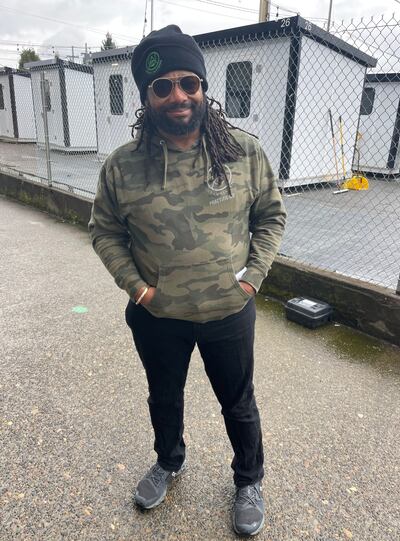
Fentanyl, meth and other illegal drugs are frequently used at Clinton Triangle, according to people who have stayed there.
In interviews, Clinton Triangle guests said they were counseled by staff to avoid taking drugs in public spaces, and keep it behind the closed doors of their living quarters.
But lighting up in a pod puts residents in conflict with the site’s conditional use permit, which prohibits smoking or open flames in these structures. And since last summer, at least one pod has burned down, according to Portland Fire & Rescue records.
In interviews, Clinton Triangle residents said they sometimes take the batteries out of city-required smoke detectors or move them to the floor before they use drugs that require a heat source.
Urban Alchemy staff is tasked with making frequent “welfare checks,” knocking on pod doors day and night to try to keep people from harming themselves, and has access to Narcan to combat overdoses. A former staffer estimated that he personally responded with Narcan to 20 overdoses in a three-month period.
Portland Fire & Rescue is also called to respond to emergencies. Records obtained through a public information request show more than 20 emergency responses for drug overdoses.
This month, Clinton Triangle had two guests who died, according to a city official. The causes of the March fatalities were not disclosed.
In a February interview, Tyler said no guests had died from drug overdoses at Clinton Triangle or the two other sites managed by Urban Alchemy. In a city where drug overdose deaths have skyrocketed among the homeless (123 in 2022), he cites that as an important accomplishment.
“Our rules say you can’t light up [in pods], and that’s true,” Tyler says. “But at some point, we’ve got to be pragmatic about our solutions that deal with real people in a way that keeps them safe.”
Clinton Triangle resident Charlene Brown says she was saved by staff, who revived her with multiple doses of Narcan, after she took meth that had been spiked with fentanyl. Brown now attends three recovery classes a week as well as a support group that in February started weekly meetings at Clinton Triangle.
“If I would have been in a tent, I would be dead right now,” Brown adds.
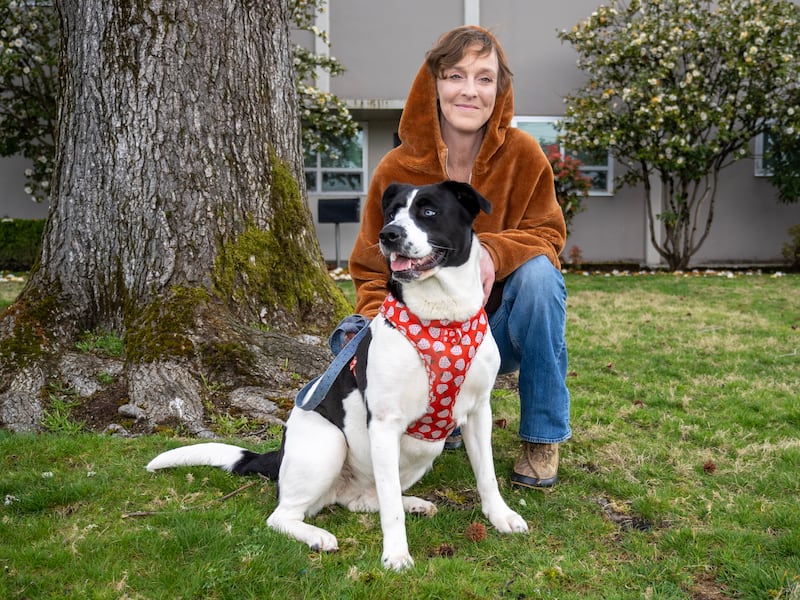
Yet several staffers have allegedly helped to feed the drug addictions of people who take shelter at Portland Urban Alchemy sites. Five guests told WW that, on occasion, they purchased drugs from staff. They all requested anonymity to talk about their illegal transactions.
“I have a meth problem, and I was getting sold meth by the people who work there,” said a man who stayed last summer at Urban Alchemy’s Reedway site in Southeast Portland.
At Clinton Triangle, a woman who stayed there told WW she repeatedly purchased cannabis from a staffer who also offered fentanyl, coke and meth. Another guest said he obtained fentanyl several times from a staffer. And two women said they purchased meth on occasion from an Urban Alchemy employee.
Wilson-Drake says two staffers, at different times during his four-month stay at Clinton Triangle, approached him to try to buy meth.
“I never sold them anything. I never wanted to do anything to put my housing at risk or give drugs to the people who are supposed to be helping us,” he says.
A former staffer at Clinton Triangle says he received numerous reports from guests alleging some staff was dealing drugs, and noted that some staff came to work high. He says he relayed these concerns to managers, as well as reports of staff working the graveyard shift who pilfered personal items of guests held in a common—and supposedly secure—storage area.
Related: Urban Alchemy transferred an employee facing allegations of sexual misconduct to Oregon.
Earlier this month, two Urban Alchemy employees who were repeatedly accused of drug dealing were placed on administrative leave, and several guests conspicuously dealing meth and fentanyl were booted out of Clinton Triangle, according to the former staffer.
“It’s been a persistent problem. It took a lot of pushing,” says the former staffer, who spoke on condition of anonymity due to fear of retaliation.
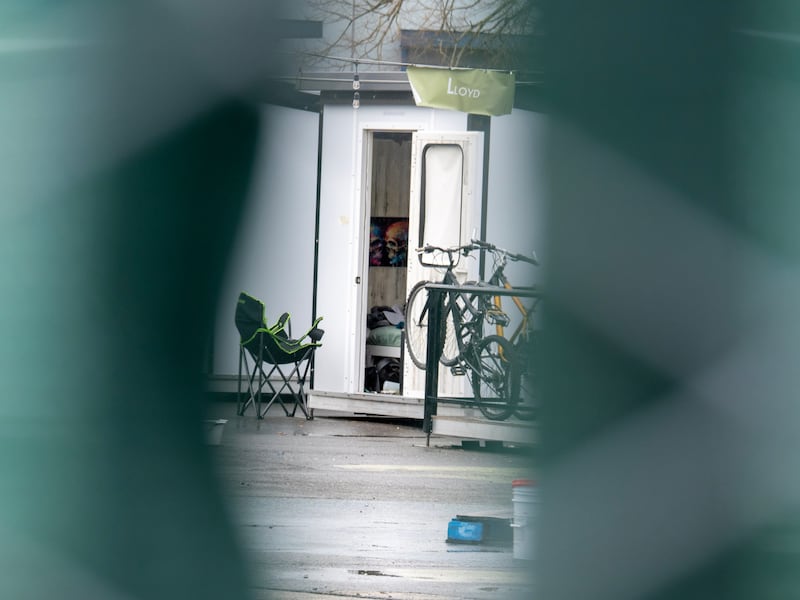
City officials initially told WW they had not received any allegations of drug dealing by Urban Alchemy staff. But in a statement released March 26, Bryan Aptekar, a city communications liaison, said Urban Alchemy had made them aware earlier this month of allegations of drug dealing by staff. “If this is true, it is completely unacceptable,” Aptekar said. “We trust our partners to keep us informed and to address things thoroughly and swiftly.”
In February, Urban Alchemy’s Tyler said the company investigates all allegations of staff drug dealing, which he describes as “predatory and completely against why we set these places up.” In Portland, no allegations of drug dealing have been verified, Tyler said.
Tyler did not respond to a later request from WW to comment on the investigation disclosed by the city.
“We’re not superheroes… There is always the potential for someone to relapse,” he said in the February interview. “We do our due diligence anytime there is an allegation, and immediately remove that staff person from the site. Even if the end of the investigation shows there wasn’t any truth to it, we don’t usually return that person to the site.”
Tyler wants the focus to stay on Urban Alchemy’s accomplishments.
“We know that people are housed. We know that people are safe. Those aren’t allegations,” he says. “We are able to document that.”
By the end of February, the population at Clinton Triangle had swelled to 191 people who ranged in age from their late teens to more than 60. The 120 men and 71 women shared the site with 35 dogs and four cats.
Some arrived after their campsites had been dismantled in the sweeps that intensified last year. Others moved in through a referral process headed up by city officials.
Campers in the neighborhoods surrounding Clinton Triangle do not gain any priority access to the shelter. But there has been considerable outreach to persuade more of these people to move to Clinton Triangle or other temporary shelters.
At a sprawling campsite along Southeast Division Street, some people said they would like to vacate and move into Clinton Triangle.
Others were determined to stay away from the shelter site, including Tobi, who on a February afternoon was cooking a meal of peach pancakes, sausage and potatoes over an open fire to share with friends. Tobi had been contacted several times by outreach workers. She said she needed to live in open spaces and was wary of Clinton Triangle staff.
“I have people all around me that look out for me—and you don’t necessarily find that inside,” said Tobi, who declined to give her last name.
But the violence that can quickly erupt in a homeless camp pushed others to Clinton Triangle.
Tim Porter is a rail-thin gray-bearded man who speaks with the soft drawl of his home state of Arkansas, and traveled across the country from Maine to Alaska before ending up in Portland, where he’s spent most of the past 14 years on the streets.
In December, his tent camp under the Hawthorne Bridge drew some unwelcome neighbors who heated tinfoil to smoke blue pills laced with fentanyl.
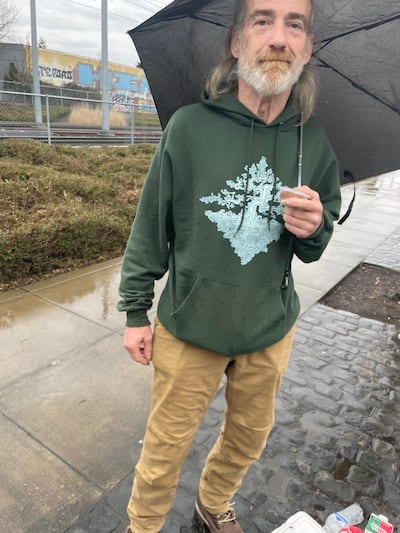
One of his buddies, Michael Hart, upset about the smell, confronted the new arrivals. Shots were fired. Hart fell to the ground and died of his wounds.
By the time police arrived, the suspect (who has yet to be found and charged) had fled. Porter, 56, then secured a referral to Clinton Triangle.
In December, just two weeks into his stay there, he seemed optimistic.
A month later, in January, he appeared much more frustrated, grousing about staff whom he accused of hoarding some of the best snacks that were supposed to be distributed to residents.
In February, he abruptly packed up his belongings and returned to life outside. The trigger? A bongo player had moved into a nearby pod. Porter complained that he played incessantly.
“Most unfortunate,” Porter said during a brief call from Southwest Portland, where he was once again camping. “I don’t do bongos.”
Wilson-Drake found Clinton Triangle a huge step forward from his life on the streets, where he turned to heroin to dull the pain from his Crohn’s disease. He figured the addiction would either kill him or, as he stole to feed his habit, send him back to prison, where he had earlier spent five years after pleading guilty in 2012 to felony attempted robbery at a Home Depot in Portland, according to circuit court records.
While still without shelter, he turned to methadone treatment, which he has continued through a four-month stay at Clinton Triangle and a January move into a 115-year-old red brick apartment in Southwest Portland.
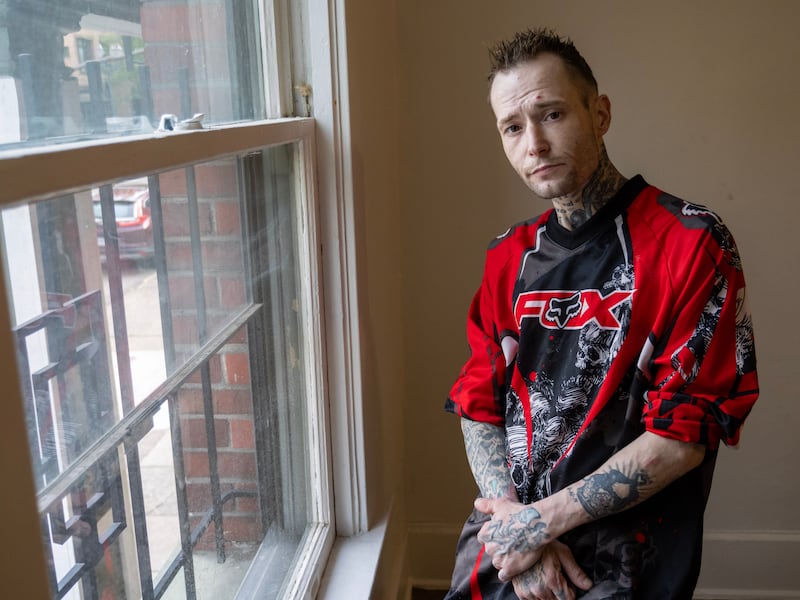
Wilson-Drake was at the tail-end of the surge of people who left Clinton Triangle for apartments with the help of the first round of state dollars. Many were eager, but also anxious about making the move into apartments, fearing they could not afford their lodging once public subsidies—up to $24,000 annually for rent and other expenses—got cut off.
Wilson-Drake had a rocky start to his new life as a renter. His bike was stolen, and neighbors complained he made too much noise at night. Even with the methadone treatment, Wilson still deals with chronic pain from Crohn’s disease that often strips him of his appetite and makes it difficult to walk.
But in a life full of setbacks, Wilson-Drake is determined to make this work, and hopefully reconnect with a daughter from a 2016 marriage that ended in divorce and a judgment for child support.
He has retrieved his laptop computer from a pawnshop and plans to finish two associate degrees that he almost completed while serving his sentence at Santiam Correctional Institution. He hopes to find employment so he can foot the bill for his $1,050-a-month rent once the taxpayer support ends.
“I need to find a job,” Wilson-Drake says. “A year goes by quickly.”
Hal Bernton is a Portland-based journalist who has spent nearly three decades reporting from around the Pacific Northwest with occasional forays to Alaska. He can be reached at hbernton@gmail.com.

